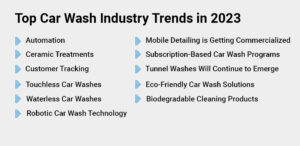After spending time analyzing auto detailing over the past several years, we thought it would be a good idea to summarize a few of the things we have observed that might impact the industry in 2023 or for many years to come.
Think back to the 1980s or even the 1990s prior to the Internet when most consumers washed vehicles themselves. Now, mobile apps are available and the economy of on-demand has transformed things.
Google Trends says that compared to 2008, ‘Auto Detailing’ is twice as common as other Googled topics. It’s no secret that 2008 was a difficult economic year. But the industry has recovered and looks to be thriving.
The good thing is that the auto detailing industry is still growing (depending on which source you use). This being said, let’s look at car wash industry trends that you should pay attention to this year and for years to follow.
Let’s get going.
Top Car Wash Industry Trends in 2023
1. Automation
Automation has revolutionized the way we do business in every industry. It is becoming one of the major car wash industry trends, even though car washes are slow to adopt newer technology. By speeding up the processes, new technology can help car wash businesses deal with rising labor costs.
The first is that car washes recognize the monthly members using Radio-Frequency Identification Chips (RFID). Customers value convenience, and RFID chips make their visits easier. A scanner scans the RFID chip in the windshield of the driver when they arrive at your facility. Your system allows the driver to pass and charges their card. Customers can wash their cars without having to show a membership card or prove their identity.
A license plate reader is another automation technology that can serve a similar function. A license plate reader is a less accurate technology than RFID but can still read the information of every customer, regardless if they have a loyalty card or not. You may increase your understanding of your clientele and utilize that knowledge to enhance your marketing.
Automating car washes can also help reduce tunnel collisions. Modern anti-collision systems can detect automobiles in the present rather than projecting where they should be. The conveyor will shut off when it detects a collision. This system makes customers happy and keeps their cars safe. It cuts down on costly downtime and reduces the damage to the building.
2. Ceramic Treatments
The ceramic technology is relatively new to car wash chemicals, but already it has shown amazing results. A ceramic treatment system is expected to become a major profit center. In the past, ceramic protection technology was used to protect a car’s surface by using polysilazane and heat lamps. This prevented water from pooling or beading. It took many hours to apply the ceramic protectant, which made it exclusive to auto dealers and detailing shops.
The silica dioxide formula is simplified, enhancing hydrophobicity. This means that water will be displaced faster. The ceramic sticks to the car’s finish and has a self-cleaning function that keeps dirt and filth that is negatively charged at bay. The product includes a 30-day warranty and a shine-like hand wax.
Some car washes charge as much as $4 for a ceramic treatment upgrade. This new product is loved by customers for its superior shine and protection. Many facilities have increased their average ticket sales by more than $1 per customer. Therefore, you can develop an on-demand app for your car wash business with the help of an on-demand app development company.
3. Customer Tracking
Car washes can now track their customers using RFID chips and license plate readers. Customer tracking allows you to streamline your customer’s experience and gather critical data for improving your business. For instance, monitored users may have their cars washed more quickly and efficiently.
CRM can help you identify your customers and their preferences for services. This is yet another one of the most popular car wash industry trends. The information will help you expand your reach, improve marketing strategies and provide more services that your customers prefer.
You can also increase your profitability. You can also send personalized offers to your most loyal clients. The car wash industry struggles with slow weekdays and busy weekends. Customers wait longer when business is booming. This limits revenue.
You can use CRM software to send limited-time coupons and encourage your customers to visit on slow days. Also, you can also develop a cross-platform app with the help of a hybrid app development company to send coupons and offers to customers. However, you can accommodate more customers during busy times, and increase business on slow days.
4. Mobile Detailing is Getting Commercialized
We think it’s important to note that small businesses are finding it harder and more expensive to attract young consumers, especially with the advent of mobile apps. For proprietors of small businesses with a few employees, this offers both difficulty and opportunity. Consumers are ready to pay for services, but convenience is their top priority.
The car wash app development allows anyone to book a car detail or wash, and have it done at their home or office within hours. Flyers and yellow pages, which were once effective marketing tools, are no longer relevant. Instead, modern strategies such as running ads on social media platforms and entertainment platforms should be used.
5. Waterless Car Washes
The next among the popular car wash industry trends is the rise of waterless car washes. Waterless vehicle washes have grown in popularity as awareness of water shortage and its effects on the environment has grown.
These innovative car washes utilize specially formulated products that clean and protect the vehicle’s surface without the need for traditional water-based methods. Instead of using gallons of water, waterless car washes employ advanced cleaning agents that break down dirt and grime, allowing them to be wiped away without rinsing.
This saves water and lessens the amount of chemical runoff that enters water systems. Waterless car washes offer several benefits, including convenience, time savings, and portability. They can be performed anywhere, making them ideal for urban environments where access to water and dedicated car wash facilities may be limited.
Additionally, the products used in waterless car washes often contain protective elements such as wax or polymers that leave a glossy finish and provide a layer of protection against contaminants.
6. Subscription-Based Car Wash Programs
This is one of the most used car wash industry trends that has gained popularity due to its convenience and on-demand nature. Mobile car wash services bring the car wash experience directly to customers, eliminating the need for them to drive to a physical car wash facility.
Customers may arrange an appointment and have their vehicles washed in their desired location, whether it’s their house, office, or any other convenient location, with mobile car wash services. Customers will save time and effort as a result of not having to stand in a queue or go further to have their cars cleaned.
Typically, mobile car wash services use specialized vans with water tanks, cleaning materials, and equipment. They provide a variety of services, ranging from straightforward exterior washes to extensive detailing packages. Even more services, such as interior cleaning, waxing, and polishing, are provided by certain companies.
The mobile car wash industry trends appeal to busy individuals who value convenience and want to maintain the cleanliness and appearance of their vehicles without the hassle of going to a traditional car wash. It also caters to those who may have mobility issues or prefer to have their cars cleaned at their preferred location. So, if you also want your car wash business to explore a subscription-based app program, then you must hire dedicated developers who can develop a robust app.
7. Robotic Car Wash Technology
Robotic systems are being integrated into car wash facilities to provide efficient and consistent cleaning processes. These automated systems use advanced technology to perform tasks that were traditionally done manually by human operators.
Robotic car wash technology offers several advantages. First, it reduces the reliance on human labor, which can help minimize costs for car wash businesses. Robotic systems are the future of the car wash industry they can operate continuously without breaks or fatigue, ensuring consistent performance and faster turnaround times.
Furthermore, robotic car wash systems are designed to be gentle on the vehicle’s surface while providing a thorough cleaning. They utilize specialized brushes, nozzles, and sensors to navigate around the vehicle, removing dirt and grime effectively without causing scratches or damage.
Robotic car wash industry trends and technology also allow for customization and flexibility. The systems can be programmed to adapt to different vehicle types and sizes, ensuring a tailored cleaning experience. Additionally, they can integrate with other technologies, such as water recycling systems and digital payment solutions, to enhance efficiency and convenience for customers.
8. Eco-Friendly Car Wash Solutions
With increasing environmental concerns, car wash businesses are actively seeking ways to reduce their ecological footprint. They are transitioning from traditional chemical-based cleaning products to biodegradable alternatives that are safer for the environment.
Eco-friendly car wash solutions are formulated with ingredients that minimize the release of harmful chemicals into water systems. These products are designed to effectively clean vehicles while being less toxic and non-polluting. They often incorporate natural and sustainable ingredients that are derived from renewable sources.
By using eco-friendly cleaning products, car wash businesses can contribute to water conservation efforts and reduce their impact on local ecosystems. Additionally, these car wash industry trends are safer for employees who handle the products and for customers who come into contact with the washed vehicles.
Additionally, consumers are growing more eco-aware and value companies that put sustainability first. By offering eco-friendly car wash options, businesses can attract and retain environmentally conscious customers, further driving the adoption of these solutions.
9. Touchless Car Washes
In order to clean the surface of the automobile without actually touching it, touchless car washes employ high-pressure water and specialized cleaning agents. This method reduces the risk of scratches or damage that can occur with traditional car washes that utilize brushes or other physical contact.
Touchless car washes offer several advantages. First, they are less likely to cause damage to the vehicle’s paint or delicate parts, making them a preferred choice for owners of high-end or luxury cars. Second, the high-pressure water and cleaning solutions used in touchless car washes can effectively remove stubborn dirt and grime, resulting in a thorough cleaning.
Additionally, touchless industrial car washes are often faster than traditional car washes, providing a time-saving option for busy car owners. They are also preferred by customers who are concerned about the potential damage that physical contact may cause to their vehicles.
10. Biodegradable Cleaning Products
The car wash industry trend of using biodegradable cleaning products in the car wash industry reflects a growing concern for environmental sustainability. Biodegradable cleaning products are formulated to break down naturally and pose minimal harm to ecosystems when they enter water systems. They are made to be non-toxic and free of dangerous chemicals, which lessens the environmental effect of conventional cleaning products.
By adopting biodegradable cleaning products, car wash businesses can contribute to water conservation efforts and minimize their ecological footprint. These products are designed to be effective in removing dirt and grime from vehicles while being gentle on the environment. They help prevent the release of pollutants into waterways, protecting aquatic life and maintaining water quality.
Moreover, the use of biodegradable cleaning products aligns with changing consumer preferences for eco-friendly services. Customers are actively seeking out companies that prioritize sustainability since they are becoming more aware of how their decisions are affecting the environment. Car wash businesses may draw clients that care about the environment and set themselves apart from the competition by using biodegradable cleaning supplies.
11. Tunnel Washes Will Continue to Emerge
Tunnel washes continue to improve and become more technological. Many washes have become outdated and will be replaced, torn apart, or equipped with new technology, such as sensor-controlled gates or light shows in the tunnel.
It is likely that touchless car washes or soft-touch car washes are going to continue to be popular in North America. This is why providing personal, humanized detail services will become so important. It is difficult to compete with a customer who won’t pay more than $20 to $30 per month to get more than a car wash. However, the size of the global market, particularly in EMEA is growing, so there are many franchise opportunities.
Conclusion
The auto detailing market is expected to grow, but the average auto detailer will face increased competition, including car washes that are technology-driven and mobile detailing firms. To stay competitive, you are required to update the equipment you use and also invest in developing an app for your car wash business. You can take help from a mobile app development company for better results.
These car wash industry trends demonstrate an industry-wide focus on sustainability, convenience, automation, and enhanced customer experiences. Car wash businesses are continuously evolving to meet the changing preferences and expectations of consumers while minimizing their environmental impact.
FAQ
How Much Does Custom Car Wash App Development Cost?
The car wash app development cost can vary depending on factors such as features, complexity, platform (iOS, Android), and development resources. However, a rough estimate for a basic car wash app can range from $25,000 to $40,000, while more advanced apps can cost upwards of $50,000.
How to Build Car Wash Apps?
In order to create car wash booking app for your business, you need to follow the below steps:
- Define app features and functionality.
- Design an intuitive user interface.
- Develop the app using programming languages and frameworks.
- Integrate essential features like booking, payment, and notifications.
- Test and refine the app.
- Deploy the app to app stores.















